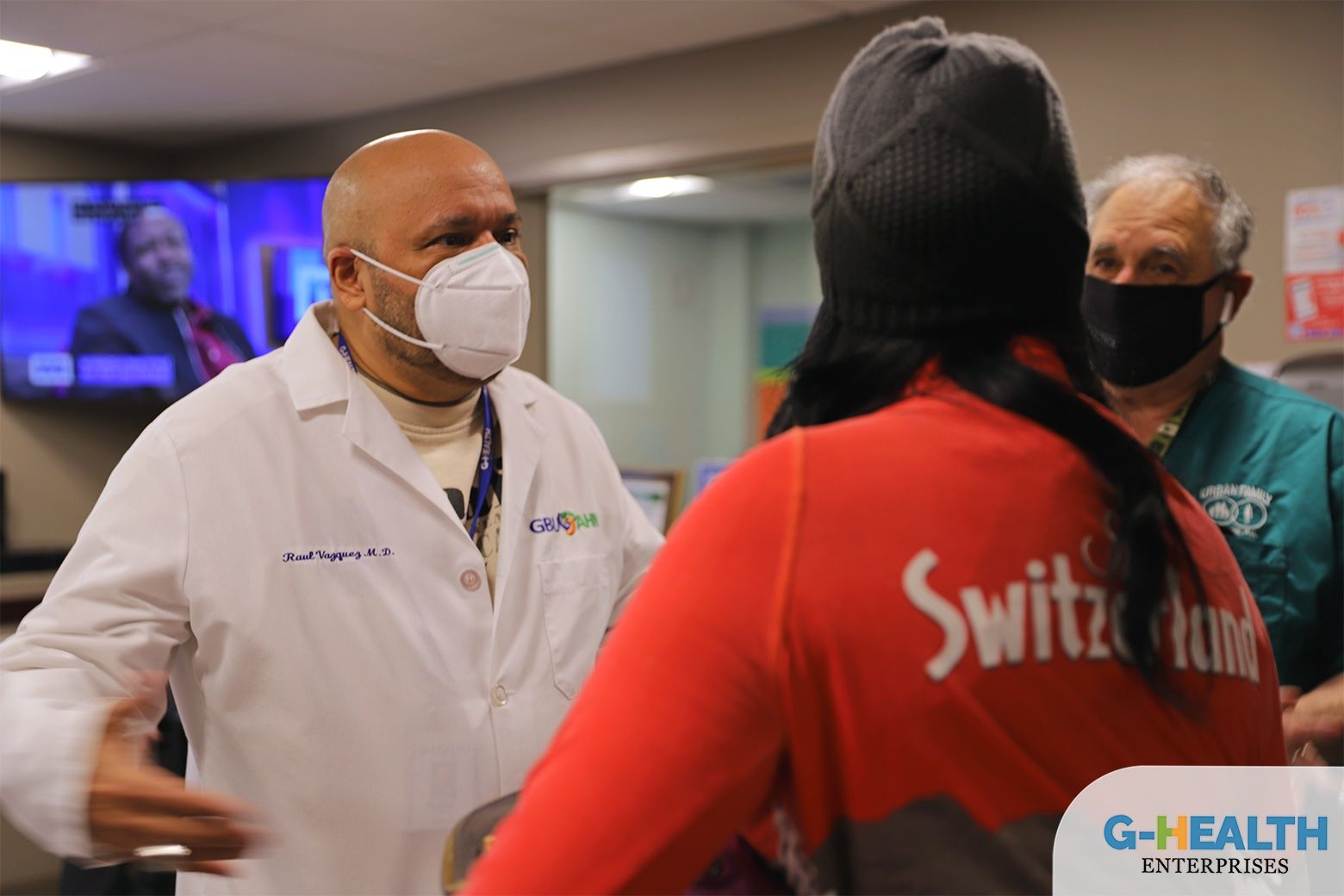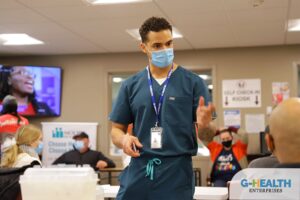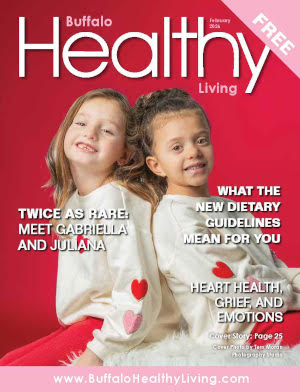COVID Vaccine – This Medical Practice’s Staff Took the Vaccine and So Should You!

COVID Vaccine
This Medical Practice’s Staff Took the Vaccine and So Should You!
by Annette Pinder
If you haven’t had the opportunity to hear from Raul Vazquez, MD, FAAFP, President and CEO of G-Health Enterprises, you should. Dr. Vazquez, a primary care physician practicing medicine in Buffalo for 30 years, refers to himself as a kid from the NYC projects who got into medical school. Initially planning to return to his roots, Dr. Vazquez remained in Buffalo where he saw a need, opening Urban Family Practice on Buffalo’s west side in 1996. Since then, he created Greater Buffalo United Accountable Healthcare Network (GBUAHN), to become one of Buffalo’s largest minority employers serving thousands of patients.

The main thing I have come to learn about Dr. Vazquez is his no-nonsense approach to getting things done, even when getting things done seems impossible. Therefore, it did not surprise me when I learned that nearly all of his staff have received the COVID vaccine. Through a series of town halls conducted for his entire staff, along with his chief medical director and pharmacist, Dr. Vazquez was able to respond to their questions to help alleviate their fears. A sample of those questions appear below.
Can we trust the vaccines which seem to have been developed too quickly? Yes! The technology used to make these vaccines has really been under development for more than 20 years. Large allocations of government money helped minimize costs and risk for the manufacturers involved that helped speed the process.
What is different about these vaccines? Can they change my DNA? Vaccines like the polio vaccine are made by injecting people with a form of the weakened virus. The new COVID vaccines use a small piece of the spike protein of the virus that causes COVID to trick the body into thinking it is getting the virus, and then mount a response to it.
Are there some people who should not get the vaccine? Everyone should get the vaccine when they become eligible. This includes people especially with underlying medical and autoimmune conditions who are at a greater risk of getting a more severe form of COVID. If you have had an allergic reaction to other vaccines in the past, you may need to receive Benadryl prior to getting the vaccine, and be watched for 30 minutes to an hour after receiving it to make sure you do not have a reaction.
Is it safe for women who are pregnant or nursing to take the vaccine? Yes, the American College of Gynecology recommends that all women who are pregnant or nursing get the vaccine, especially since pregnant women are at a greater risk of getting a more serious form of COVID.
Can the vaccine cause bell’s palsy (a condition that causes facial paralysis)? A few people involved in the clinical trials got bell’s palsy, but the frequency with which it was seen was no different than what would naturally occur in the general population. Bell’s palsy is associated with a bacterial infection and would not be caused by the vaccine.
Is there any cost for the vaccine? No, the vaccine is fully covered by the government. There are no additional fees.
How long do the antibodies from the vaccine last? Researchers believe the antibodies will last a long time, from perhaps two to four years. Levels will be monitored in those who received the vaccine to confirm that.
Will you need the vaccine if you’ve had COVID? Yes. If you’ve had a mild form of COVID you may not have acquired the antibodies you need to fight the virus. Everyone needs to take two doses of this vaccine to reach a level of 95 percent immunity from it. This will ensure that even if you get COVID, you will get a much milder form of it. When you receive the vaccine you will be given an appointment for the second dose.
Once I get the vaccine, do I still need to wear a mask, practice safe-distancing, and practice proper hygiene? Yes! Until we reach herd immunity, or hear otherwise from the CDC, we must do what is needed to keep one another safe.
Why is the vaccine particularly important for people of color? People of color have been more adversely affected by COVID than their white counterparts. We understand that the United States does not have a great track record in treating people of color, based on the Tuskegee experiment and Henrietta Lacks. But since then, there have been safeguards put into place to prevent this from ever happening again. These safeguards can be reviewed in the Belmont Report, which identifies basic ethical principles and guidelines that address ethical issues arising from the conduct of research with human subjects.
Is there anything I need to know about the flu vaccine and the COVID vaccine? It is important to get a flu vaccine to stay healthy, but wait 14 days after your flu vaccine before getting a COVID vaccine.
What else can I do to strengthen my immune system? Get tested for vitamin D. Many people, especially here in Buffalo don’t get a lot of sunshine and are vitamin D deficient. Studies have shown that individuals who had more serious cases of COVID were vitamin D deficient, so check with your provider and get a test.
What else can I do to help dispel the myths regarding the vaccine to keep the people I love safe? Get educated. Ask questions. Get answers. Yes, we lived through terrible injustices, but we have safeguards against those injustices now. Additionally, one of the main scientists to create these new vaccines is an African American woman who worked with Dr. Fauci. Tell your friends, tell your family, tell your neighbors.
Dr. Vazquez and his staff want everyone to know that they have a choice — to take this vaccine or not. Taking the vaccine assures people of a 95 percent chance of not getting the virus and a 5 percent chance of getting only a very mild form of it. Often it is a choice between life and death. He also emphasizes the importance of coming back for the second dose to be protected. He says, “This is going to take a 100 percent commitment as much as possible. We are seeing the equivalent of a 911 disaster at roughly 4,000 deaths daily. We are becoming numb to these numbers, but It doesn’t have to be this way. We are in this together and we need to save lives.”
Listen to Dr. Vazquez’ town halls at https://vimeo.com/497038289 and https://vimeo.com/495796122. Learn more about G-Health Enterprises, GBUAHN, and Urban Family Practice at https://ghealthenterprises.org. To make an appointment to see a provider at Urban Family Practice call 716-247-5282, where you can also receive a rapid COVID test.
Dr. Vazquez will be joined by local COVID expert Kenneth V. Snyder, MD, PhD, VP Physician Quality at Kaleida Health to answer your specific questions on Wednesday evening February 10 and February 17 at 8 pm and on Saturday afternoon February 13 and 20 at 12 noon at WBBZ-TV on Spectrum, DISH, and Verizon Fios on Channel 5 and DirecTV channel 67. Submit your questions to info@buffalohealthyliving.com, or to either WBBZ or Buffalo Healthy Living’s Facebook pages.









